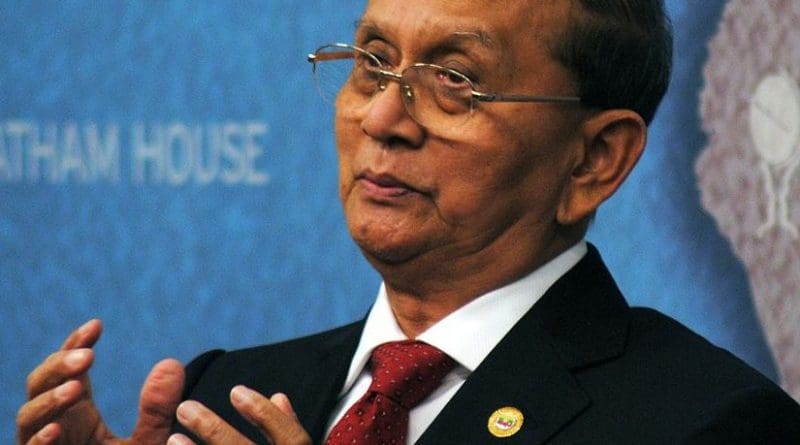Sino-Myanmar Ties: Lessons From The ‘Myitsone Dam Event’ – Analysis
By RSIS
Myanmar-China relations, strained by The “Myitsone Event”, have avoided the worst situation. However only safe and sustainable Chinese investments will bring benefits and restore mutual confidence.
By Lu Guangsheng*
On September 20 2011, Myanmar’s president Thein Sein “abruptly” announced the temporary suspension of the Myitsone Dam Project (hereinafter referred as the “Myitsone Event”) during his tenure. The Myitsone Dam Project entailed a total investment plan of US$3.6 billion, the biggest Chinese investment in Myanmar to date. The suspension of the project can be regarded as a landmark event for causing the Chinese government and the public to be “highly concerned” and seriously undermining Chinese investment and even bilateral relations.
The controversial Myitsone Event is still not settled today and has become a “thorn” in Sino-Myanmar relations. On 8 November 2015, Myanmar will hold a new general election which is likely to further disrupt Chinese investment and even worsen Sino-Myanmar relations. During this period, it is necessary to review the Myitsone Event and assess present and future bilateral ties.
No solution in the short term
Over the past few years, the Myitsone Event had featured at all levels of bilateral talks between China and Myanmar, involving the president, president’s special envoy and other officials. Restarting the Myitsone Dam Project is China’s intent, but Myanmar avoids the issue all the time, and as a result, there has been no substantive progress.
On 21 May 2015, the first meeting of the Sino-Myanmar electric power cooperation committee working group was held in Beijing to discuss solutions for the Myitsone Dam Project. However, in the face of the coming election, the Myanmar government refuses to present a clear statement. This makes it hard for both sides to arrive at a solution in the short term.
Although the hydropower plant project did not resume operations, the two countries have already dealt with the Myitsone Event and did not allow it to strain bilateral relations. In China, the general public opinion is that China has been “slapped” by Myanmar: despite massive Chinese support during the junta period from 1988 to 2010, Myanmar has turned its back on China by treating Chinese projects badly. Since its 2010 democratic reform, Myanmar is now in an all-out effort to appease its general public and please the West. Under these conditions, China must make a strong response to safeguard other projects, especially the Sino-Myanmar Oil and Gas Pipeline Project.
On the other hand, some Burmese organisations and individuals regard the Myitsone Event as “a landmark achievement” of Myanmar’s democratic transition. They claim that they “never make concession to the powerful northern neighbour”. In the face of pressure from China, some Burmese call for a national donation to pay for the loss of China’s state-owned enterprise, China Power Investment Corporation (CPI). Besides, they protest against Chinese investment by means of mass demonstrations and bad publicity.
Solving the problem
Fortunately, China and Myanmar are trying to resolve the problem. Many Burmese leaders, including President Thein Sein and Aung San Suu Kyi, claimed that Myanmar always welcome Chinese investment; that China is Myanmar’s important neighbour and partner; and that Myanmar has no intention to alienate or even oppose China.
More importantly, China is increasingly aware of the inevitability of the Myitsone Event and other related events amid Myanmar’s transition to democracy. A normal relationship will replace the “special relationship” between the two countries. Based on this understanding, the two sides should collaborate and rationally discuss the solutions for some disputes. From this perspective, the two countries avoided the worst outcome of the Myitsone Event and laid a new and costly but solid foundation for bilateral relations.
Changes in Chinese investment in Myanmar
Chinese investment in Myanmar peaked at US$8.3 billion in 2011 but sharply declined soon after —$4.6 billion in 2012, $0.4 billion in 2013 and US$0.3 billion in 2014. From the data, we can conclude that “Chinese investment in Myanmar sharply declined after the suspension of the Myitsone Dam Project”.
However, this conclusion is just “one side of the coin”. According to investigations and studies over the years, Chinese investment in Myanmar is changing. Firstly, China is always the number one source of foreign investment for Myanmar. By the end of 2014, Chinese total investment reached $14.67 billion, accounting for 27.7% of Myanmar’s total amount of foreign capital. China is still Myanmar’s largest trading partner and investor.
Secondly, there are some new changes in Chinese investment in Myanmar. Unlike the wait-and-see strategy adopted by state-owned enterprises, some Chinese private enterprises, small and medium-sized enterprises, remained active in the Myanmar market in recent years. Although some Chinese investors registered their companies in Hong Kong, Macau, Singapore and then invested in Myanmar, these statistics are excluded from the total of Chinese investment in Myanmar. This shows that statistics on Chinese investment in Myanmar is undervalued.
Thirdly, some Chinese investors have learnt from experience and adopted some positive measures to improve. For example, they shifted their focus from resources and energy to industries endorsed by the Myanmar government such as manufacturing, infrastructure, communication, hospitality, financial services, and other industries. Other measures include improving project transparency and environmental protection standards, actively carrying out corporate social responsibility, upgrading local management expertise, attracting local workers and improving work standards, etc.
Obviously, to a certain extent, these positive phenomena can be attributed to lessons learnt from the Myitsone Event. Ensuring safe and sustainable development of Chinese investment in Myanmar will bring benefits and restore confidence in Sino-Myanmar relations.
*Lu Guangsheng is professor at Yunnan University and currently a Visiting Senior Fellow with the China Programme at the S. Rajaratnam School of International Studies (RSIS), Nanyang Technological University, Singapore.

